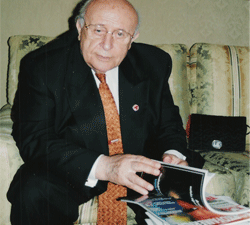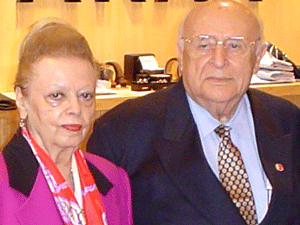Suleyman Demirel: "We Need 30 Years to Reach the American Standards"
- Written by Admin TOA
- Published in Politicians
Suleyman Demirel, the ninth President of Turkey, gave a special interview to Turk of America during his stay in New York. During the meeting, he told the Turkish community in the US that “they should not be depressed nor feel any inferiority complex. We started this race 150 years behind, but now need 30 more years to reach the American standards.”
Central Park South in Manhattan hosts many hotels with exquisite views of the Central Park. Essex House Hotel is one of these breathtaking places. The Hotel now has very specials guests: Suleyman Demirel, the ninth President of Turkey, and his wife Nazmiye Demirel.

President Demirel is observing TurkofAmerica magazine.
Turk of America visits these specials guests in their room. We are treated as guests and welcome with chocolate offered by Nazmiye Demirel. This helps us calm down a little. It is hard not to be excited when you see a persona that left his mark on the last 40 years of Turkey while being the focus point of many articles, interviews and documentaries; a politician who is surely one of the central names of Turkey’s quest for democracy.
It is hard to argue that the Demirels are now enjoying their life as retirees after decades of political victory, defeat, governance, even exile. They actually prove that one cannot retire from politics. In slightly over one hour, Mr. Demirel demonstrates his characteristic ability of having a computer-like memory, which is a prerequisite to pursue a successful political career. He recalls the names of dams and projects that he visited in the US when he first came here in 1949. He describes the Wood Market in Eskisehir, where he visited during 1960s as if a photograph lays before us. He tells about the crack on the main body of the Porsuk Dam in 1950s. He quickly delivers a brief lecture about how he prevailed in a slippery political ground for 40 years and provides his insightful recommendations to the Turkish community in the US.
“IT IS IN THE US THAT I LEARNED WHAT A DAM IS”
Mr. Demirel thinks that he learned a lot about his profession when he came to Denver in 1949. He says he had the opportunity to visit many dams, names of which he can recount. “At that time we had only three dams. One of them was the Porsuk Dam, which was leaking through a serious crack on its body. The other two were the Gebere Dam in Nigde and the Bilecik Dam. But we learned about dams from the US. Later on, I sent 300 engineers to America, so that they can observe the latest developments and apply the same in Turkey.”
When asked if he partly owes his nickname as the “Dam King” to his time in the US, Mr. Demirel replies, “Of course. We learned dam-building in the US.” In 1954-55, when he came here for the second time, his focus shifted to the electricity system. After citing a statistic that at that time only 13 out of 35 thousand villages in Turkey had electricity supply, Mr. Demirel remembers: “I examined the electricity policies of different states, I researched how the electricity system in Tennessee worked. Then I implemented what I learned in Turkey.”
DO NOT FEEL INFERIORITY COMPLEX
Mr. Demirel provides some recommendations to Turks living in the US: “Do not get caught up in an inferiority complex in this society, do not feel uncomfortable. Anti-American approaches such as ‘America is a developed, rich country. We are poor, so we should be hostile towards them’ are not productive. Nor should we put our national pride and identity aside and bow to America. Our underdevelopment is not a product of the Republic or our democracy. It is the result of a historical process. There is nothing that obstructs our development. Today Turkey has many things that I saw in the US 50 years ago. We started this race from 150 years behind and need 30 years to catch them.”

Nazmiye & Suleyman Demirel.
Emphasizing that 3% of the American population works in agriculture and another 3% works in universities, Mr. Demirel continues: “Amerika does not only benefit its own population, but other societies of the world, too. It teaches other nations, supports them. If the US builds roads or dams, engineers from all countries learn from it so that they can do the same. Americans account for 5 percent of the world population, but produce one third of the world output. In other words the US does not need the rest of the world, it is self-sufficient. There is so much to learn from this country. Instead of promoting hostility because they are rich and developed, one should try to understand how they are developed. In the 19th century developed nations used to exploit the underdeveloped nations. This is no more valid.”
IT’S WRONG TO INSIST ON GOING BACK
As for the brain drain, Mr. Demirel is clearly against a pressuring approach. He emphasizes that people who came to the US should stay there as long as they make better to their country.
“I don’t have a negative view of people who do not think about going back. If they are not productive here, if they are not going to be productive in Turkey, it’s better if they stay. They should try to increase their knowledge to a level where it can help them survive here.”
Mr. Demirel argues that path to a strong lobby passes through successful individuals: “Every single Turkish citizen living here must become a success in his/her own field. He/she should be respectable and must have enough power to survive on his/her own if not wealthy. Power and respect should be the priorities of Turkish citizens in the US.”
DO NOT FEEL INFERIOR IN A FOREIGN LAND
Former President believes that it is wrong for Turks living abroad to feel worried or depressed: “Do not feel inferior in a foreign land. If you are feeling that way, just go back to your country. You should value this soil as if it is your own.”
When we asked how a politician should evaluate the American reality, he responds by employing several clichés: “If refusing to become a servant or even a fan of a country means being its enemy, one should be hostile to the entire world. Making enemies here and there cannot do any good to you. No country in the world would become your friend for the sake of it. International friendship means a mutually beneficial relationship. There are no more politically-driven country aids in the world. We want to grow and develop. We do not harbor thoughts like ‘Help us so that we can develop.’ One should take these points into consideration when evaluating the US.”
THERE SHOULD BE MORE TURKISH BUSINESSMEN
During his stay here, Mr. Demirel paid a visit to Sarar’s new retail store in Woodbury Outlet. He elaborates that there are more and more successful Turkish entrepreneurs in 51 different countries and that it is important for them to increase their presence in the United States. Mr. Demirel describes the tiny little Sarar Store at the wood market in Eskisehir, where he visited for a political rally and says that coming out of a little town and becoming a global brand is an exemplary success for other companies. He also cites a double standard: “On one hand you support your own businessmen when they go abroad and invest in textile, jewelry, and food industry, on the other hand when an American comes and invests in your country, you will oppose and say that this as Americanism. In this country income per capita is 34 thousand dollars, ten times more than what we have. This means an individual in the US earns as much as 10 people in Turkey. Let them stay here and be productive. At the end of the day, their country will benefit from it.”
“WE ARE NOT GOING TO IRAQ FOR A CONQUEST"
Regarding deployment of Turkish troops in Iraq, Mr. Demirel reminds us that Turkey sent military units to Korea, Somali, Bosnia, Kosovo and Afghanistan in the past. He believes that the decision to send troops to Iraq is very important in terms of relations of two neighboring countires: “We are not going there for a conquest, we are going there to help.” The former President commented that Turkish military presence will help the stabilization of Iraq.
(November 2003, Issue 10th)
Last modified onSaturday, 06 May 2017 10:07
Latest from Admin TOA
- World Energy Council Türkiye Holds the Opening Meeting of the Young Energy Leaders (YEL’26) Program
- The Shared Pulse by Eda Uzunkara
- NEO HUMAN 10.0: How Will the Future Be Shaped? (Filiz Dag)
- Calculatit.net Is Bringing Pricing Transparency to America’s Construction Industry
- Support Independent, Trustworthy Journalism








